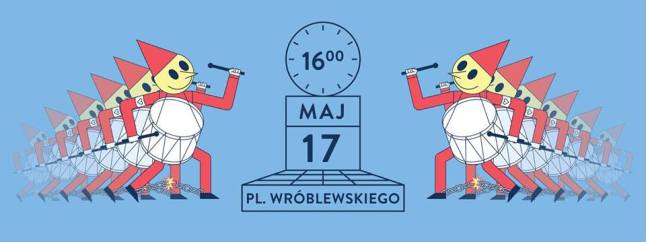Yesterday saw the second “Wroclaw for everyone” parade.
Due to illness I couldn’t go myself, but can say that public manifestations of support for tolerance and opposition to prejudice are a very good way of raising awareness of the topic as well as giving people strength. That the figure of about 400 participants was way below that of 1,200 last year had a lot to do with the weather, competition from the “night of museums” event as well as, perhaps, a sense that hate crimes are less of an issue for people, seeing that there have been less violent right-wing attacks. In any case, let’s look further at what the term “Wrocław for everyone” can mean in the praxis as well as that of multiculturalism in Wrocław in general.
Look, you know that I am supportive of Manifa (which took place in March), yeah? I wrote a nice article about it, and attended it, for the second time now. While I was walking along I was talking with someone who said that a friend of theirs, a woman, is the kind of person who would attend, but wouldn’t, as it was “done by people of a particular scene”.
“That’s her problem”, said I. It is entirely right that the issue of feminism is done in an anti-capitalist way, seeing as our political fight takes place in the framework of a capitalistic society, and all that. I questioned whether this woman is tolerant enough to put aside political differences in order to try to achieve something.
However, someone said to me that the issues dealt with by the march like abortion are minority issues for women in Poland, and that child care and general support for mothers are much more relevant. Well now lo and behold, the feminist Agnieszka Graff said in this article that Polish feminists don’t address motherhood. Like as was said about Manifa, the people organising it did it for themselves, and not for women in general. Now, I find that an exaggeration, but saying that, a look at their Facebook page shows many photos of the organisers, as if to to say “here is our march, it was us”.
That’s OK. A healthy civic society has people prepared to be active about subjects that matter to them, and of course it’s better that people go to Manifa than parades against women working (or whatever it is that these hysterical “stop the sexualisation of children” parades are about).
It’s like when I’ve approached NGOs about doing projects with them but was knocked back for not being “one of them”. I’m not all angry or anything, just that it shows that while it is good to have core groups who look out for each other, a real Wrocław for everyone would see people looking outside of that small group. Social mistrust is big in Poland, for various historical reasons (this would take another article, but just briefly they include a post-1945 focus on “national unity” and that different serfs were emancipated at different times following the 18th century division of Poland). What I’m saying it, it’s OK, I’m not calling anyone bad or saying people have bad intentions, just that implicit exclusion can happen by those who work for inclusion.
Opening up doesn’t mean watering down politics to a bland mainstream view (that would be ghastly), rather, admitting that if we want a multicultural Wrocław to work (and more than 97% of Vratislavians do) we need to look at just who we are prepared to speak and work with. I don’t want to go down the relativist route of “well, all people discriminate, as it is natural”, rather, to point out that this exclusion happens due to historical reasons, and is as such a social construction that can be changed.
Attempts to help the Roma from Romania “integrate” are part of this change. Though the issue of “integration” has a lot to do with power, but that’s a matter for a future article.

